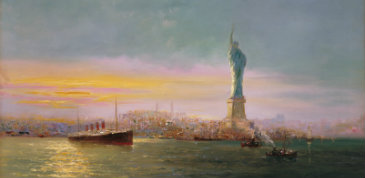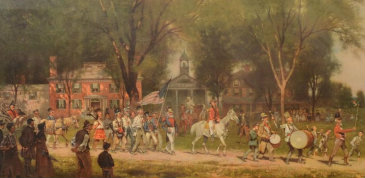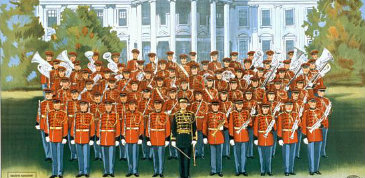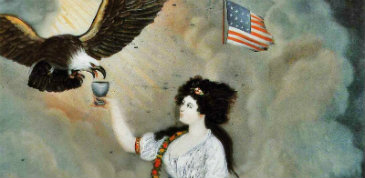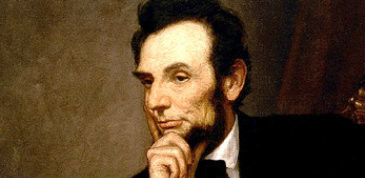Select one or multiple and then click Browse
By Author
Abigail Adams
Abraham Lincoln
Alexander Godin
Alexander McClure
Alexis de Tocqueville
Alice Walker
Allen C. Guelzo
Ambrose Bierce
Amy A. Kass
Ana Menendez
Anna Howard Shaw
Anthony Grooms
Archibald MacLeish
Arthur Schlesinger Jr.
Barack Obama
Benjamin Franklin
Benjamin Hanby
Benjamin Harrison
Bill D. Ross
Billy Collins
Booker T. Washington
Bret Harte
Bruce Catton
Caitrin Keiper
Calvin Coolidge
Carl Sandburg
Charles W. Eliot
Charles W. Harwood
Christopher G. Memminger
Claude C. Robin
Clement Clarke Moore
Cornel West
Dana Gioia
Daniel Patrick Moynihan
Daniel Webster
David Ramsay
Diana Schaub
Diane Oliver
Dorothy Canfield Fisher
Douglas MacArthur
Dwight D. Eisenhower
E. B. Sledge
Earl Warren
Edgar Guest
Edith Wharton
Edward Everett Hale
Edwin Arlington Robinson
Edwin E. Aldrin Jr.
Edwin Markham
Edwin P. Whipple
Elias Lieberman
Elizabeth Bishop
Elizabeth Cady Stanton
Emily Dickinson
Emma Lazarus
Ernest Hemingway
Ernie Pyle
Eudora Welty
F. Scott Fitzgerald
Florence White Williams
Frances Gilchrist Wood
Francis Bellamy
Francis Hopkinson
Francis Miles Finch
Francis Scott Key
Franklin Delano Roosevelt
Frederick Douglass
George F. Root
George III
George M. Cohan
George S. Patton Jr.
George W. Bush
George Washington
Gerald Early
Gish Jen
Gordon S. Wood
Gordon Weaver
Gouverneur Morris
Grace Paley
H. B. Carrington
Harriet Beecher Stowe
Harry S. Truman
Harvey Mansfield
Henry Archer
Henry Armitt Brown
Henry Brooks Adams
Henry Holcomb Bennett
Henry James
Henry Lee
Henry Louis Gates Jr.
Henry Van Dyke
Henry Wadsworth Longfellow
Henry Ward Beecher
Herbert B. Adams
Herbert Hoover
Herman Melville
Horace Mann
Irving Berlin
Jack Conroy
Jack London
James A. Garfield
James Baldwin
James Baldwin
James Bradley
James Freeman Clarke
James Madison
James McHenry
James P. Collins
James Pierpont
James Russell Lowell
James Sloan Gibbons
James Thacher
James W. Ceaser
James Whitcomb Riley
Jane Addams
Joaquin Miller
Joe Carter
Joel Barlow
John A. Logan
John Adams
John Ciardi
John Dickinson
John F. Kelly
John F. Kennedy
John Fiske
John G. Roberts
John Greenleaf Whittier
John M. Harlan
John Marshall
John McCain
John McCrae
John McWhorter
John Noble Wilford
John O. Killens
John Philip Sousa
John Updike
Johnny Cash
Joseph B. Foraker
Joseph Bottum
Joseph H. Jackson
Joseph Hopkinson
Joyce Kilmer
Juan Williams
Julia Ward Howe
Junius Edwards
Kate Chopin
Kate Douglas Wiggin
Katharine Lee Bates
Kurt Vonnegut Jr.
Langston Hughes
Lee Martin
Leon R. Kass
Lindley Hoffman Miller
Louisa May Alcott
Lowell Mason
Lucretia Mott
Lydia Maria Child
Lyndon B. Johnson
Maeve Brennan
Malcolm X
Manuela Crosno
Marge Piercy
Mark Twain
Martin Luther King Jr.
Mary Antin
Mary B. C. Slade
Mary Lerner
Mary Raymond Shipman
Mason Locke Weems
Maya Angelou
Michael R. Strobl
Michael Shaara
Michael Walzer
Moina Michael
Mother Jones
Myron Magnet
Nancy Byrd Turner
Nathaniel Hawthorne
Nathaniel Niles
Ninette M. Lowater
Noemie Emery
O. Henry
Oliver Wendell Holmes Jr.
Oliver Wendell Holmes Sr.
Omar N. Bradley
Oscar Hijuelos
Pat C. Hoy II
Patrick Henry
Paul Laurence Dunbar
Pearl S. Buck
Philip Van Doren Stern
Phillips Brooks
Phillis Wheatley
Ralph Ellison
Ralph Waldo Emerson
Richard Brookhiser
Richard Rodriguez
Richard Watson Gilder
Ring Lardner
Robert Frost
Robert Hayden
Robert Penn Warren
Ronald Reagan
Rose Schneiderman
Rutherford B. Hayes
Samuel Adams
Samuel Francis Smith
Samuel Gompers
Samuel Shaw
Sandra Cisneros
Sarah Josepha Buell Hale
Sarah Orne Jewett
Shelby Steele
Stephen Crane
Stephen E. Ambrose
Stephen L. Carter
Stephen Vincent Benet
Steven F. Hayward
Stevie Wonder
Studs Terkel
Sullivan Ballou
Susan Glaspell
Susan Minot
Theodore O’Hara
Theodore Roosevelt
Thomas Jefferson
Thomas Paine
Timothy Dwight IV
W. E. B. Du Bois
Walt Whitman
Walter Berns
Walter Kittredge
Washington Irving
Wendell Berry
Willa Cather
William Billings
William Bradford
William Brennan
William Carlos Williams
William Cullen Bryant
William Dean Howells
William H. Barnes
William H. Herndon
William H. Rehnquist
William Hubbard
William J. Connell
William Jefferson Clinton
Witold Rybczynski
Woodrow Wilson
Woody Guthrie
Zachary Gold
Zora Neale Hurston
By Title
Abraham Lincoln and the Gettysburg Address
Abraham Lincoln and the Slavery Question
Abraham Lincoln, Chief Executive and Commander-in-Chief
Lincoln and the Reframing of America
America the Beautiful
Battle Hymn of the Republic
God Bless America
My Country, ’Tis of Thee
The Star-Spangled Banner
This Land Is Your Land
Guide for Washington’s Thanksgiving Proclamation
Guide for “Two Thanksgiving Day Gentlemen”
Compassion: Toward Neighbors
Courage and Self-Sacrifice (Part 1)
Courage and Self-Sacrifice (Part 2)
Enterprise and Commerce
Equality
Freedom and Individuality
Freedom and Religion
Law-Abidingness
Making One Out of Many
National Identity and Why It Matters
Self-Command
American Names
American Sonnet
Becoming a Redwood
Caged Bird
Chicago
Frederick Douglass
I, Too, Sing America
Mending Wall
Old Ironsides
Sestina
Tell All the Truth But Tell It Slant
The Man Born to Farming
The New Colossus
The Red Wheelbarrow
A Lincoln Memorial
A Stepmother’s Recollection
A Timeline of Abraham Lincoln
A Very Peculiar God: Reading Lincoln’s Second Inaugural Address
Abraham Lincoln by George Henry Story
Abraham Lincoln’s Re-founding of the Nation
Address on Abraham Lincoln
Address on Lincoln’s 200th Birthday
Article Two
Centennial of Abraham Lincoln’s Gettysburg Address
Chiefly About War-Matters by a Peaceable Man
Crown His Blood-Stained Pillow
Emancipation Proclamation
Emancipation Proclamation Centennial Address
Excerpt from the Cooper Union Address
Excerpt from the Eulogy of Henry Clay
Excerpt from the Peoria Speech
Excerpt from “The President’s Policy”
Farewell Address, 1861
First Inaugural Address, 1861
From Lincoln’s Yarns and Stories
from The People, Yes
Gettysburg Address
House Divided Speech
Last Public Address
Letter to Erastus Corning and Others
Letter to J. W. Fell
Lincoln
Lincoln at Two Hundred
Lincoln Centennial Address
Lincoln Monument: Washington
Lincoln, the Man of the People
Martyr
Message to Congress in Special Session
O Captain! My Captain!
Open Letter to Horace Greeley
Oration in Memory of Abraham Lincoln
Sonnet
Speech to the 166th Ohio Regiment
The Answer
The Emancipation Group
The Kentucky Home
The Master
The Origins and Traditions of Lincoln’s Birthday Holiday
The Perfect Tribute
The Perpetuation of Our Political Institutions
When Lilacs Last in the Door-Yard Bloom’d
A Christmas Guest
A Christmas Visit from St. Nicholas
A Luckless Santa Claus
A Worn Path
Christmas
Christmas Day in the Morning
Christmas Every Day
Christmas Gift
Christmas in America
Christmas Trees: A Christmas Circular Letter
Haskell Hooked on the Northern Cheyenne
How Santa Claus Came to Simpson’s Bar
I Heard the Bells on Christmas Day
Is There A Santa Claus?
Jingle Bells
Joy to the World
Madame Martel’s Christmas Eve
O Little Town of Bethlehem
Old Folks’ Christmas
Old Folks’ Christmas
Our Christmas Tree
The Burglar’s Christmas
The Christmas Banquet
The Gift of the Magi
The Greatest Gift
The Joker
The Loudest Voice
The Mystic’s Christmas
The Romance of a Christmas Card
The Story of the Other Wise Man
Three Wise Guys
Up on the Housetop
White Christmas
Wise Guy
America is Hard to See
Americanism
Aria: from Hunger of Memory
Columbia, the Gem of the Ocean
Columbus (1892)
Columbus (1903)
Columbus (1919)
Columbus a Heretic and a Visionary to His Contemporaries
Columbus and His Discovery of America
Columbus and the Egg
Discovering Columbus
Excerpt from The Columbiad
Excitement at the News of the Discovery
First Landing of Columbus in the New World
from Democracy in America
Hail, Columbia
In the American Society
Little Selves
My Dead Brother Comes to America
Ode to Columbia
Pioneers! O Pioneers!
Prayer of Columbus
Proclamation on the 400th Anniversary of the Discovery of America by Columbus
Remarks on Signing the Columbus Day Proclamation, 1988
Statement on Columbus Day, 1940
The Luck of Roaring Camp
The Origins and Traditions of Columbus Day
The Ships of Columbus by Ivan Aivazovsky
The Significance of Columbus Day to New Americans
Turkey Red
Visitors, 1965
Was America a Mistake?
What Columbus Day Really Means
A Short History of the American Flag
Address at Flag Day Exercises
Address on Flag Day
Address to the Brooklyn 14th Regiment
Barbara Frietchie
Dissent from Texas v. Johnson
From Halter v. Nebraska
From Making Patriots
From Texas v. Johnson
From The Red Badge of Courage
From the Ashes Comes the Rebirth of Patriotism
I Am an American
Our Flag by Frederic Edwin Church
Pledge of Allegiance
Proclamation 1335 – Flag Day, 1916
Proclamation 2614 – Flag Day, 1944
Proclamation 7573 – Flag Day, 2002
Ragged Old Flag
Raising the Flag
Raising the Flag on Iwo Jima
Remarks at a Flag Day Ceremony
Stars of the US Flag: A Timeline
The Color Guard
The Flag Goes By
The Meaning of Flag Day
The Namesake
The Origins and Traditions of Flag Day
The Pledge of Allegiance at the Hanoi Hilton
The Song of the Banner at Day-Break
The Star-Spangled Banner
The Stars and Stripes Forever
US Flag Code
You’re a Grand Old Flag
A Frenchman’s Estimate of Washington in 1781
A Short Biography of George Washington
A Trip to Mount Vernon
Abraham Lincoln on George Washington
Address on the Newburgh Conspiracy
Address to a Joint Session of Congress on the Bicentennial of Washington’s Birthday
Farewell Address
Farewell Address to the Armies of the United States
Farewell Address to the Continental Congress
First Inaugural Address
George Washington and the Modern Presidency
George Washington as Exemplary President
George Washington by Rembrandt Peale
George Washington! A Funeral Oration on his Death
George Washington, Model Executive?
Greatness and Commemoration
Hero, Standing
Historical Memorabilia of Washington
Introduction, from Founding Father
Letter to George Washington, 1787
Letter to Henry Lee in Congress on Shays’ Rebellion
Letter to Martha Washington, 1775
Letter to Mary Cranch
Letter to the Hebrew Congregation of Newport, Rhode Island
Letter to the Marquis de Lafayette, 1784
Letter to Walter Jones
Letters on Washington’s Resignation
Making an American
Ode for Washington’s Birthday
Radio Address on Washington’s Birthday
Rules of Civility & Decent Behaviour in Company and Conversation
Thanksgiving Proclamation, 1789
The Appointment of General Washington
The Character of Washington
The Crisis, No. 1
The Fable of George Washington and the Cherry Tree
The First Continental Congress
The Genius of Washington
The Greatness of George Washington
The Origins and Traditions of Washington’s Birthday Holiday
The Passionate Bedrock of Genius
The Rise of Washington
The Trials and Triumphs of Presiding
The Vow of Washington
The Wisdom of George Washington
To His Excellency General Washington
Valley Forge
Washington and Our Schools and Colleges
Washington and the Constitutional Convention
Washington Monument by Night
Washington the Nation Builder
Washington’s Inauguration
When George Washington Became Great
Young Washington and Cato
A Brief History of Independence
A New Eden
A Pretty Story
A Proclamation for Suppressing Rebellion and Sedition
A Village Patriot
Account of the Battle of Kings Mountain
Account of the Vote for Independence
Address to the Nation, July 4, 1942
America
Chester
Concord Hymn
Declaration and Resolves of the First Continental Congress
Declaration of Independence
Declaration of the Causes and Necessity of Taking up Arms
Eulogy for Adams and Jefferson
Fourth of July Ode
Fourth of July Oration
Freedom’s Plow
Give Me Liberty, or Give Me Death
Independence Day
Letter to Congress, 1775
Letter to H. Niles
Letter to His Parents
Letters to Abigail Adams, 1776
Liberty Tree
My Kinsman, Major Molineux
No Alternative than Independence
Ode
Old Esther Dudley
Oration on the Advantages of American Independence
Paul Revere’s Ride
Speech at Independence Hall
Speech on the Fourth of July, 1872
Speech on the Occasion of the 150th Anniversary of the Declaration of Independence
The American Dream
The American Hero: A Sapphick Ode
The Antiquity of Freedom
The Centenarian’s Story
The Declaration of Sentiments
The Fourth in Salvador
The Fourth of July
The Fundamental Principle of a Republic
The Last of the Sacred Army
The Liberty Song
The Meaning of Liberty
The Origins and Traditions of Independence Day
The Rebels
The Republic
The Siege at Yorktown
The Soldier of the Revolution
The Volunteer Boys
Unveiling the Statue of Liberty by Edward Moran
What July Fourth Means to Me
What to the Slave is the Fourth of July?
Yankee Doodle
A Groundhog’s Death
Automobile Industry by William Gropper
Excerpt from Waiting for the Weekend
Fireside Chat, Labor Day 1936
Free Time from Spheres of Justice
I Hear America Singing
Labor Speaks
Martinez’ Treasure
The Apostate: A Child Labor Parable
The Ballad of John Henry
The Choice of Hercules
The High Place of Labor
The Labor Movement in America
The Little Red Hen
The March of the Mill Children
The Mason: Carl Murray Bates from Working
The Origins and Traditions of Labor Day
The Significance of Labor Day
The Village Blacksmith
To Be of Use
Triangle Memorial Speech
What Does the Working Man Want?
Whitewashing the Fence from Tom Sawyer
Working as Meaningful Fulfillment
A Brief History of the Civil Rights Movement
A Call for Unity
Address to the 1964 National Baptist Convention
Affirmative Action: The Price of Preference
Brown v. Board of Education
Dreaming of a Black Christmas
Eulogy for the Martyred Children
Everyday Use
Food That Pleases, Food to Take Home
Freedom Songs
From Enough
From Notes of a Native Son
God Bless America
Growing Up Colored
Happy Birthday
How Can We Save the African-American Race?
How It Feels to Be Colored Me
I Have a Dream
I’ve Been to the Mountaintop
Keep Your Eyes on the Prize
Letter from Birmingham Jail
Letter on the Civil Rights Movement
Letter to the Orlando Sentinel
Liars Don’t Qualify
Lift Every Voice and Sing
My View of Segregation Laws
Neighbors
Of the Coming of John
Oh, Freedom
On Being Crazy
On the Situation in Little Rock
One Friday Morning
Onward, Christian Soldiers
Parents Involved in Community Schools v. Seattle School District
Race Holding
Remarks at the Martin Luther King Jr. Memorial Dedication
Remarks on Signing the Bill Making the Birthday of Martin Luther King Jr. a National Holiday
Remarks on Signing the King Holiday and Service Act
Selma-to-Montgomery March by James Karales
Solve for X
Stranger in the Village
The Ballot or the Bullet
The Battle Royal
The Black Table, the Empty Suit, and the Tie
The Civil Rights Cases
The Moral Obligations of Living in a Democratic Society
The Negro Family: The Case for National Action
The Origins and Traditions of Martin Luther King Jr. Day
The Power of Nonviolence
The Welcome Table
This Little Light of Mine
To Fulfill These Rights
We Shall Overcome
A Box Comes Home
A Date Which Will Live in Infamy
A Marine’s Journey Home
A Meaning for Monuments
A Monument for the Soldiers
A Night, from Hospital Sketches
Address at Arlington Cemetery
Address at the Monument of the Unknown Dead
Address at the Unveiling of the Soldiers’ Monument
Address to a Joint Session of Congress Following the 9/11 Attacks
Address to Congress Requesting a Declaration of War
Bivouac of the Dead
Brave Men Lost
D-Day Prayer
Declaration of Causes of Secession
Decoration Day
Decoration Day Address, 1868
Freedom and Its Obligations
General Orders No. 11
Gettysburg Address
Homage to Vietnam
In Flanders Fields
In Our Youth Our Hearts Were Touched with Fire
Letter to Fanny McCullough
Letter to Mrs. Bixby
Letter to Sarah
Marching Song of the First Arkansas Regiment
Memorial Rain: For Kenneth MacLeish
Memorials: On the Slain at Chickamauga
Night on the Line from Citizen Soldiers
Order of the Day: 6 June 1944
Planting 20,000 Flags on Memorial Day by Ellen White
Remarks at a Memorial Day Ceremony, 1986
Remarks on Memorial Day
Remarks on Memorial Day
Rouge Bouquet
Roy’s Decoration Day
Second Inaugural Address, 1865
Shiloh: A Requiem
Soldier’s Memorial Day
Stories from the Front
Tenting on the Old Camp-Ground
The Battle Cry of Freedom
The Battle Cry of Freedom (Southern Version)
The Blue and the Gray
The Dead Comrade
The Origins and Traditions of Memorial Day
The Peacemaker
The Story of a Year
Voluntaries
We Are Coming, Father Abraham
We Shall Keep the Faith
Why Should a Colored Man Enlist?
A New Pioneer
An Old-Fashioned Thanksgiving
Celebrations of Thanksgiving: Cuban Seasonings
Excerpt from Northwood
Excerpt from “No Thanks to Gratitude”
Excerpt from “The First Settlement of New England”
Excerpts from Of Plymouth Plantation
For an Autumn Festival
How We Kept Thanksgiving at Oldtown
John Inglefield’s Thanksgiving
Letter to President Abraham Lincoln, 1863
Modern Thanksgiving Proclamations
Our National Thanksgiving
Thanksgiving at the Polls
Thanksgiving Day
Thanksgiving Day (1984)
Thanksgiving Day Proclamations 1789–Present
Thanksgiving on Slav Creek
Thanksgiving Proclamation, 1789
Thanksgiving Proclamation, 1863
Thanksgiving, 1917
The Corn Song
The Lost Turkey
The Night Before Thanksgiving
The Origins and Traditions of Thanksgiving
Those Who Have No Turkey
Two Thanksgiving Day Gentlemen
A History of Veterans Day: Its Origins and Traditions
A Son of the Gods
Address on Armistice Day, 1941
Anchors Aweigh
Armistice Day Address
Digging and Grousing
Duty, Honor, Country
Letter to His Parents
Liberty Loan Parade by Arthur Clifton Goodwin
Not to Keep
Oath of Enlistment
Old War-Dreams
Over There
Prisoner of War: A First-Person Account
Reconciliation
Sacred Ground
Soldier’s Home
Speech on the Fortieth Anniversary of D-Day
The Army Goes Rolling Along
The Artilleryman’s Vision
The Day the Civil War Ended
The Marines’ Hymn
The US Air Force
The Veteran
The Veteran (1905)
The War Prayer
Veterans Day Remarks, 1961
Veteran’s Day Speech to the Semper Fi Society of St. Louis
What a Veteran Knows
Bartleby, the Scrivener: A Story of Wall-Street
The Namesake
By Video
A Jury of Her Peers
Chamberlain
Gettysburg Address
Harrison Bergeron
Project for Moral Perfection
Speech to the Third Army
The Man That Corrupted Hadleyburg
The Man without a Country
The May-Pole of Merry Mount
The Namesake
To Build a Fire
True Americanism
Veterans Day Speech
+
Browse
